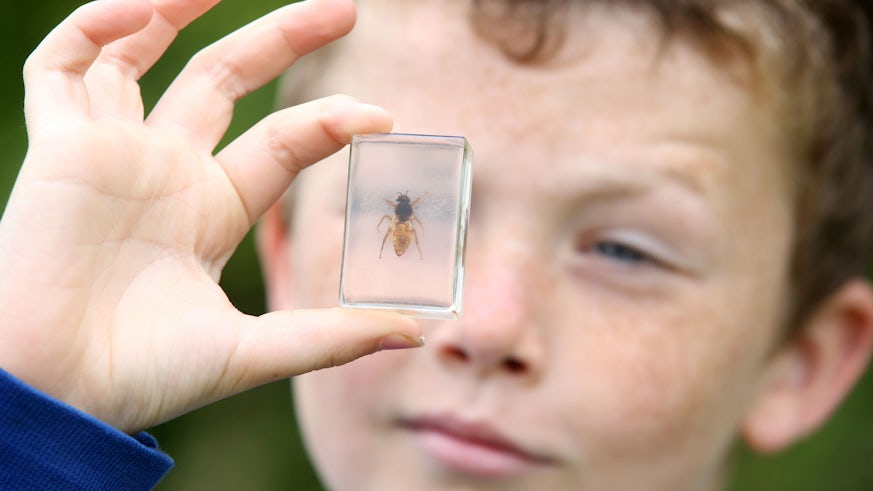£1.95m innovative outreach programme to engage South Wales Valleys school pupils in STEM
11 October 2018

Cardiff University will work with school pupils across the South Wales Valleys as part of a major Welsh Government initiative to boost take-up of STEM subjects.
Trio Sci Cymru is led by the Welsh Government’s National Science Academy, in collaboration with the Institute of Physics, and Cardiff, Swansea, Aberystwyth and Bangor universities.
The £8.2m project which is backed by £5.7m of EU funding and £2.5m from the Welsh Government’s National Science Academy, aims to increase take up and grades in STEM subjects among young people living in West and North Wales and the South Wales Valleys.
Cardiff University will receive £1.95m to deliver STEM engagement activities throughout the South Wales Valleys.
Over a three-year period, the University will engage 2,790 key stage three pupils; offering a unique opportunity to participate in three different innovative STEM enrichment outreach programmes.
Apothecary Bees, led by Professor Les Baillie of the School of Pharmacy and Pharmaceutical Sciences, will introduce pupils to the award-winning Pharmabees project, where they will learn about the importance of bees and other pollinators, the medicinal properties of honey and its potential to treat antibiotic resistance hospital superbugs.
Pupils in Year 8 will become ‘honey detectives’, helping pharmacists identify the plants responsible for the antibacterial activity of University honey. In Year 9, they will isolate antibacterial compounds from the plants. Through these activities the students will develop an appreciation of the drug discovery process and the science which underpins medicine.
Chemistry in the 3rd Dimension will use a portable 3D cinema to give pupils a chance to step inside a variety of chemical systems. The workshops will combine computational chemistry with state-of-the-art 3D projection to bring chemistry to life at the atomic level.
Students will learn how properties of everyday materials are linked to atomic structure. Workshops will be themed on the environment, plastics and drug discovery, and feature career profiles of those who have studied the subject.
The programme concludes with students designing their own computational chemistry experiments and analysing data obtained from a supercomputer simulation.
UniverseLab, overseen by Dr Paul Roche of the School of Physics and Astronomy, uses space to engage students with science, through a combination of 3D shows, virtual and augmented reality, robotic telescopes and hands-on workshops.
Exploring the Universe from their classrooms, pupils will experience how astronauts live and work on the International Space Station, and plan the future exploration of Mars. The remotely controlled Faulkes Telescopes will capture images of planets, stars and galaxies, which the pupils will monitor over the next three years.
In the workshops the pupils will study craters, meteorites and fossils, and learn about the mass extinction of the dinosaurs, while they also scan the skies searching for new asteroids, comets and supernovae.
Dr Liam Thomas, Trio Sci Cymru manager for Cardiff University, said: “Trio Sci Cymru provides a unique opportunity for us to work with a cohort of school pupils over a prolonged period of time. The programme compliments the University’s widening participation activities. We are excited by the prospect of increasing the take up of STEM subjects by delivering a cutting-edge engagement programme that brings our research direct to the classroom.”
In its five-year strategy, The Way Forward 2018-23, the University commits to helping improve educational attainment in Wales as part of its civic mission, and to educating and training the professionals of the future.
Vice-Chancellor, Professor Colin Riordan said: “We are very clear that we want to be an active participant in Wales’s education and training ecosystem, and to be taking account of the needs of Wales in our aims and ambitions. Our Trio Sci Cymru programme of engagement does just that, taking some of our most exciting and progressive research out into local schools. We hope that through our innovative engagement plans, we can inspire the next generation of scientists, and help to build Wales’s future STEM workforce.”
In total, the Trio Sci Cymru programme aims to encourage more than 5,600 young people aged 11 to 14 from 30 schools across Wales to study STEM subjects at GCSE level and beyond, helping to create a skilled workforce and a prosperous economy.
Mark Drakeford, Welsh Government Finance Secretary said: "Technology is moving at an increasing pace and for Wales to capitalise on this change we need a skilled workforce. This EU investment will help stimulate interest in these core subjects, encouraging take up and in turn growing the Welsh economy."


